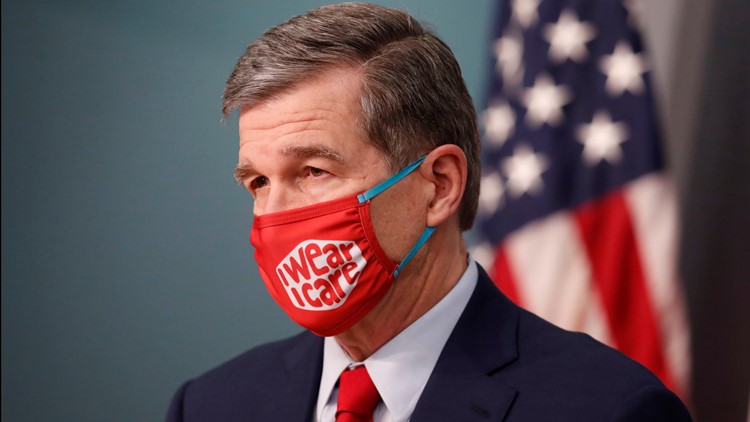CHARLOTTE, N.C. — The North Carolina Department of Health and Human Services reported that North Carolina has reached a sobering milestone in the COVID-19 pandemic — more than 10,000 North Carolinians have died from the virus. The state also surpassed 800,000 total cases today.
"Together we grieve with the family and friends of the North Carolinians who have lost their lives to this terrible pandemic," said NCDHHS Secretary Mandy K. Cohen, M.D. "Each one of these numbers represents a daughter or son, a parent or grandparent, a neighbor or friend — people who are deeply loved and who were part of the fabric of our community"
On Tuesday, Governor Roy Cooper and North Carolina Department of Health and Human Services Secretary Mandy K. Cohen, M.D., outlined how North Carolina is working to provide equitable access to COVID-19 vaccines. They were joined by Charles Evans, president of the North Carolina Association of Black County Officials and Chairman of the Cumberland County Board of Commissioners.
“Speed is critical, but we are also emphasizing equity,” said Governor Cooper. “Communities of color have been disproportionately impacted by this devastating pandemic, and the state is working to reduce the high rates of sickness this population is experiencing.”
Among the strategies that the state is implementing are requiring all vaccine providers to collect race and ethnicity data. The state is also prioritizing a portion of its weekly vaccines to events that focus on underserved communities and allocating a baseline weekly amount of vaccine based on county population to ensure geographic equity with vaccine available in all 100 counties. The North Carolina Department of Health and Human Services (NCDHHS) has formed a dedicated team to track and provide technical assistance to vaccine providers to ensure they are hitting targets for speed and equity.
“We are embedding equity into all aspects of our vaccine plan and holding ourselves and vaccine providers accountable for ensuring that underserved and marginalized communities have access to vaccines,” said Sec. Mandy K. Cohen, M.D. “The vaccine is still in short supply, but all North Carolinians will have a spot to get their shot.”
The Charlotte-Mecklenburg Schools Board of Education will meet Tuesday evening to discuss the district's plan to resume in-person learning this month. Currently, elementary and K-8 students with special needs will return on Feb. 15, while middle and high school students are scheduled to come back Feb. 22. On Monday, Gaston County school leaders decided they would bring students back to school four days a week starting March 1.
During the district's weekly metrics update Monday, Damon Willis, director of strategy, said CMS remains ready to reopen for its youngest learners as scheduled on Feb 15. However with community spread still at levels deemed ‘high’ by public health experts, some CMS teachers say they remain opposed.
U.S. Sen. Thom Tillis (R-N.C.) was among eight senators to introduce the Put Students First Act 2021 legislation. If passed, the bill would prohibit the secretary of education from providing any federal funding to schools that don't provide any in-person instruction by April 30.
Tuesday's press briefing comes as North Carolina's COVID-19 metrics continue a downward trend. According to data from the Department of Health and Human Services, hospitalizations linked to the virus have dropped 13 straight days. Meanwhile, new daily cases are down to about 3,000 per day. That's down from around 11,000 new cases per day in January.



